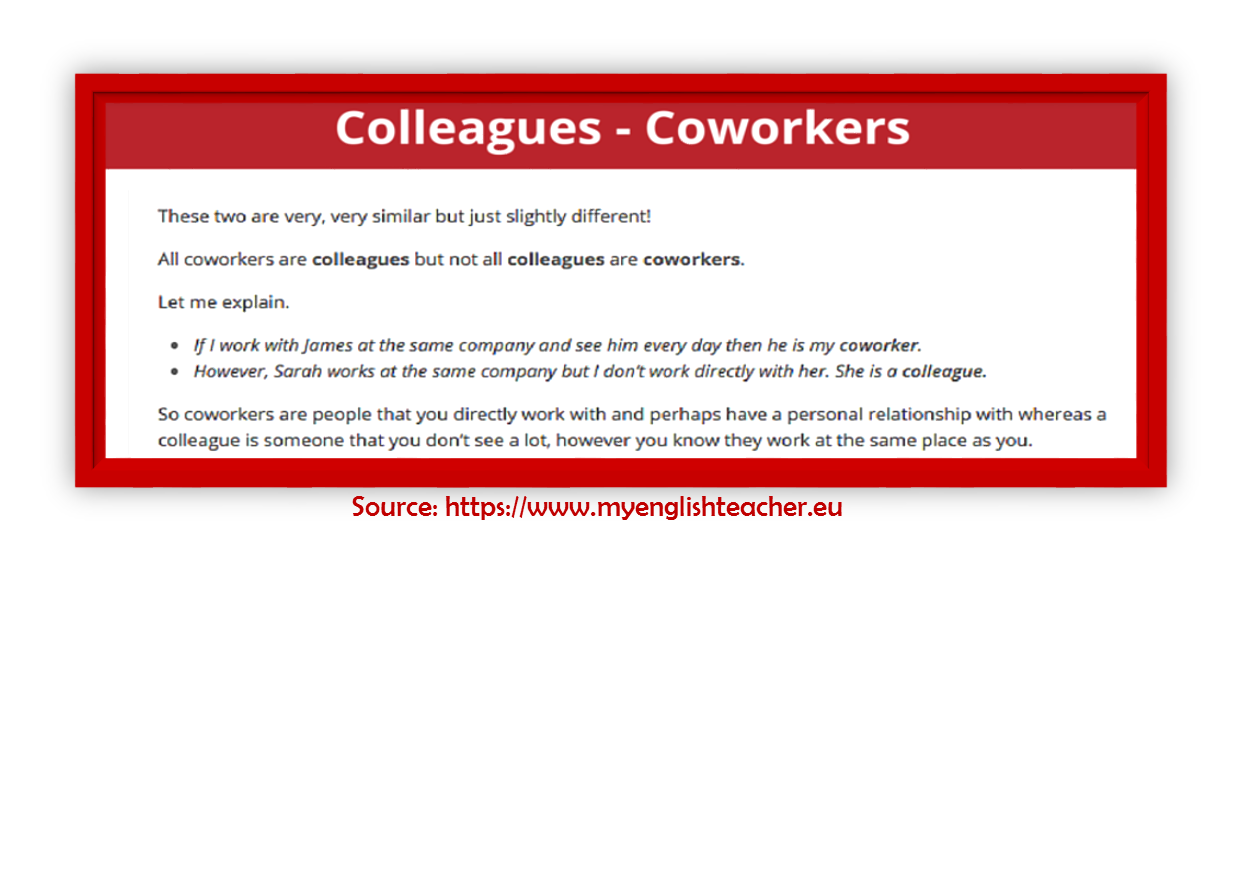In the professional world, the terms “coworker” and “colleague” are often used interchangeably, but they can hold different meanings based on context and relationships within the workplace. Understanding these differences can enhance workplace dynamics and improve communication among team members. The nuances between being a coworker and a colleague can impact teamwork, collaboration, and overall workplace culture. By differentiating these two roles, we can foster a more harmonious work environment that values both collaboration and camaraderie.
While a coworker typically refers to someone who works alongside you in the same organization or department, a colleague often implies a deeper professional relationship, potentially extending to those in different departments or organizations. This distinction becomes important when considering how we interact, collaborate, and build networks within our professional lives. By recognizing the unique traits associated with each term, we can better navigate our interactions and establish meaningful connections.
In this article, we will explore the differences between a coworker and a colleague, delve into their roles, and provide guidance on how to foster stronger relationships in the workplace. Whether you’re a new employee trying to understand the dynamics of your team or a seasoned professional looking to refine your networking skills, understanding "coworker vs colleague" can significantly impact your career growth and satisfaction.
What is a Coworker?
A coworker is typically someone who shares a workspace or a specific project with you in the same organization. They may work in the same department or on the same team, contributing to shared goals and tasks. Here are some characteristics of coworkers:
- Often work closely together on specific tasks or projects.
- Share a common workspace or office environment.
- May have varying levels of familiarity and interpersonal relationships.
What is a Colleague?
A colleague, on the other hand, refers to someone with whom you share a professional relationship but may not work directly with on a daily basis. Colleagues can be from different departments or even different organizations. Here are some traits of colleagues:
- Can belong to the same professional field or industry.
- Often have a more formal relationship compared to coworkers.
- Can provide networking opportunities and professional growth.
How Do Coworkers and Colleagues Differ in Their Roles?
The roles of coworkers and colleagues can differ significantly within the workplace. Here are some key differences:
- Collaboration Style: Coworkers typically collaborate closely on projects, while colleagues may collaborate more loosely or through networking.
- Communication Frequency: Coworkers communicate regularly due to their proximity, whereas colleagues may communicate less frequently but still maintain a professional rapport.
- Level of Trust: The trust built between coworkers may differ from that of colleagues, as coworkers often share daily experiences.
Can Coworkers Become Colleagues?
Yes, coworkers can certainly become colleagues! As relationships grow and expand beyond daily tasks, coworkers can develop professional connections that lead to a broader network. This transition often occurs when:
- Professional development opportunities arise.
- Collaborative projects involve multiple departments.
- Networking events are attended together.
Why is It Important to Distinguish Between Coworkers and Colleagues?
Understanding the difference between coworkers and colleagues is important for several reasons:
- Improved Communication: Knowing the nature of your relationship can enhance how you communicate with each person.
- Fostering Teamwork: Recognizing the differences can help in fostering teamwork and collaboration based on the roles of individuals.
- Networking Opportunities: Distinguishing between the two can lead to better networking and professional growth.
How to Build Stronger Relationships with Coworkers and Colleagues?
Building stronger relationships with both coworkers and colleagues can enhance your professional life. Here are some strategies to consider:
- Engage in Team Activities: Participate in team-building exercises that encourage bonding with coworkers.
- Network Effectively: Attend industry events to connect with colleagues across different organizations.
- Maintain Open Communication: Foster open lines of communication with both coworkers and colleagues.
Conclusion: Navigating the Coworker vs Colleague Landscape
In conclusion, understanding the difference between coworker and colleague can significantly impact your professional relationships and career trajectory. By recognizing the unique attributes of each role, you can cultivate a more effective and harmonious work environment. Whether you are working closely with a coworker or collaborating with a colleague from another department, the relationships you build will be key to your success. The distinctions between “coworker vs colleague” not only aid in effective communication but also help in creating a supportive and productive workplace culture.
You Might Also Like
Unraveling The Mystery Of MFL: What Does MFL Stand For?Cher's Iconic Clueless Clothes: A Fashion Journey
Unveiling The Magic: The Forever Movie 2024
Discovering The Allure Of Electric Strawberry Piercing
Exploring The Depths Of "My Love In Spanish"
Article Recommendations
- Whois P Diddy
- Surviving Summer Season 3
- Brandon Biggs Pastor
- Is Clem Ohameze Alive
- Richard Thomas
- Statewins
- Rhian Gittins
- Jaden Smith Diddy
- All Treasure Map Pieces In Another Crabs Treasure
- Is Halit Oezguer Sari Married


